There is a ton of hype surrounding the ketogenic diet. Some researchers swear that it is the best diet for most people to be on, while others think it is just another fad diet.
To some degree, both sides of the spectrum are right. There isn’t one perfect diet for everyone or every condition, regardless of how many people “believe” in it. The ketogenic diet is no exception to this rule.
However, the ketogenic diet also has plenty of solid research backing up its benefits. In fact, it has been found to be better than most diets at helping people with:
- Epilepsy
- Type 2 Diabetes
- Type 1 Diabetes
- High Blood Pressure
- Alzheimer’s disease
- Parkinson’s disease
- Chronic Inflammation
- High Blood Sugar Levels
- Obesity
- Heart Disease
- Polycystic Ovary Syndrome
- Fatty Liver Disease
- Cancer
- Migraines
Even if you are not at risk from any of these conditions, the ketogenic diet can be helpful for you too. Some of the keto benefits that most people experience are:
- Better brain function
- A decrease in inflammation
- An increase in energy
- Improved body composition
As you can see, the ketogenic diet has a wide array of benefits, but is it any better than other diets?
The Calorie Conundrum
Many researchers argue that ketosis (burning ketones for fuel) and carbohydrate restrictions only play a minor role in the benefits of the ketogenic diet. Their argument is that people tend to eat fewer calories on the ketogenic diet, and this is the main reason for its benefits.
It is true that people on the ketogenic diet tend to eat less because of how satiating eating a high-fat moderate-protein diet is for us. And it is also true that less calorie consumption leads to improved health and weight loss, but there is something that many researchers don’t consider.
The ketogenic diet elicits many other important mechanisms in the body and cells that are nonexistent in other diets. These unique mechanisms explain the benefits of the ketogenic diet that eating fewer calories cannot.
How The Body Adapts To The Ketogenic Diet — The Main Reason for Many of the Benefits
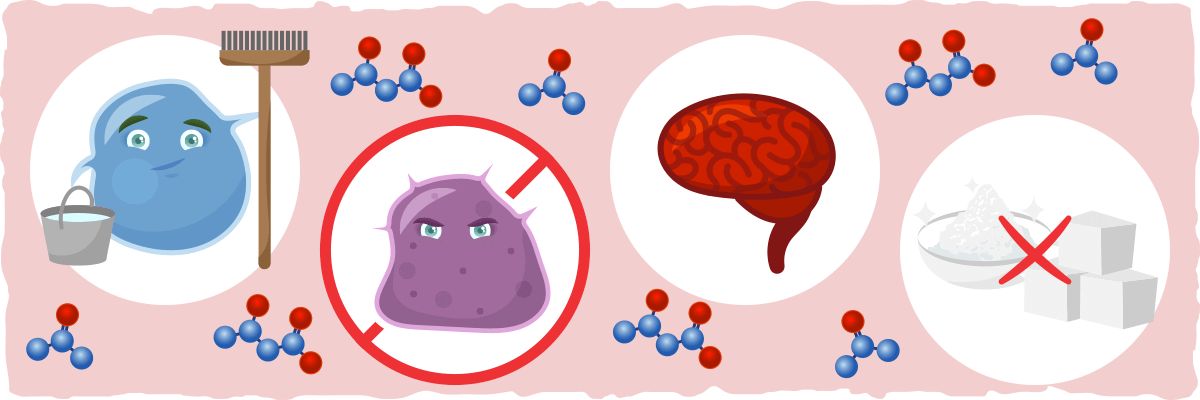
From The Cell’s Point of View
Carbohydrates are the body’s preferred fuel source. When its consumption is restricted, the body reacts as if it is fasting. This stimulates new energy pathways to provide energy for the cells. One of these energy pathways is called ketogenesis, and the result of ketogenesis is an alternative fuel source called a ketone body.
These ketones bodies can be used by almost every cell in your body for fuel (except for the liver and red blood cells). However, sugar and ketone bodies affect the body in many different ways.
For example, burning sugar for fuel creates more reactive oxygen species. These reactive oxygen species cause damage, inflammation, and cell death when they accumulate. This is why consuming too much sugar is known to impair brain function and cause plaque build up in the brain.
On the other hand, ketones provide a more efficient energy source and help protect neuron cells in the brain. This is partly because burning ketones for fuel decreases the production of reactive oxygen species and enhances mitochondrial function and production.
The healthy cells that are struggling to survive are helped by the carbohydrate restriction as well. Without access to carbohydrates, a cellular process called autophagy is activated. This process up-regulates many factors that improve cell health and resilience, clean up the cell from damage and elicit anti-inflammatory processes.
The combination of autophagy and ketone burning are essential in helping people with cancer and brain disorders like epilepsy, migraines, and Alzheimer’s.
From The Body’s Perspective
Now, let’s zoom out and look at how the ketogenic diet changes the body. It all begins with a change in insulin levels.
By restricting carbohydrates, we take the biggest stimulator of insulin out of the diet. This decreases insulin levels, increases fat burning, and reduces inflammation. The combination of these three changes addresses the primary drivers of many chronic diseases — insulin resistance, inflammation, and fat accumulation.
The Takeaway — The Mechanisms Behind The Ketogenic Diet
From a mechanistic level, here is why the ketogenic diets can lead to benefits that reach beyond caloric restriction:
On a cellular level:
- Ketones burn more efficiently than sugar.
- Carbohydrate restriction triggers autophagy and anti-inflammatory processes.
- Burning ketones for fuel creates less reactive oxygen species.
- Ketone usage enhances mitochondrial function and production.
In the body:
- Insulin levels decrease because dietary carbohydrate isn’t stimulating its release.
- Fat burning increases because the body needs to use alternative fuel sources.
- Inflammation is reduced because inflammatory fat levels decrease and less reactive oxygen species are formed.
The combination of the cellular and bodily effects of the ketogenic diet provides us with a basis for why they may be useful in the treatment of the conditions we mentioned earlier. However, this is only biochemistry. Is the ketogenic diet scientifically proven to help people with those conditions?
Treating Epilepsy — The Origins of The Ketogenic Diet
Our journey through the research on the ketogenic diet starts in 1924 with Dr. Russell Wilder. At the prestigious Mayo Clinic, Dr. Wilder designed a carbohydrate-restricted diet to treat epilepsy in children, and the research at the time indicated that it was highly effective.
The first high-quality study on epilepsy and the ketogenic diet wasn’t published until much later, in 1998. In this study, researchers recruited 150 children, and nearly all of them had more than two seizures per week despite taking at least two seizure-reducing medications. The children were provided with a ketogenic diet for a one-year trial.
After three months, about 34% of the children, or slightly over one-third, had over a 90% decrease in seizures.
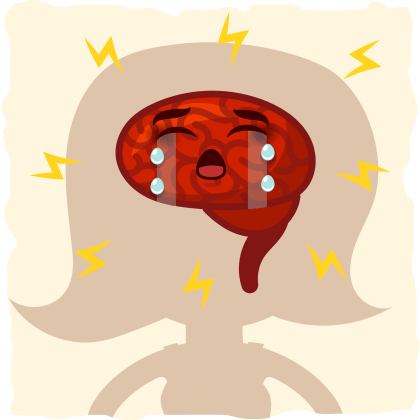
After six months, 71% of the children remained on the ketogenic diet, and about 32% had over a 90% reduction in seizures. After a full year, 55% stayed on the diet and 27% at least a 90% decrease in seizures.
Thus, the researchers stated that the ketogenic diet is “more effective than many of the new anticonvulsant medications and is well tolerated by children and families when it is effective.” Not only was the ketogenic diet helpful, but it was more helpful than some commonly used drugs.
More recently, a meta-analysis was published in the Journal of Neurology that assessed the impact of the ketogenic diet in treating epilepsy. It included a total of 19 studies with a total of 1084 patients. After analyzing the data, the researchers noted that the patients who stayed on the diet had a 2.25 times greater probability of treatment success (at least a 50% reduction in seizures).
The Takeaway: With or without the help of medication, the ketogenic diet is effective in reducing seizures.
Recommendations: If conventional therapies are not helping you or your child lower the frequency of seizures, strongly consider using a ketogenic diet. Remember to discuss a suitable plan with your doctor and a registered dietitian, and monitor its effectiveness. Use Ruled.me to gain access to critical information on the keto lifestyle and community that will help you stick to the diet.
For more in-depth information, check out:
The Ketogenic Diet in Reversing Type 2 Diabetes
Insulin resistance is a widespread problem that, if not properly managed, can lead to prediabetes and eventually type 2 diabetes. Thankfully, abundant research suggests that modifying your diet to a low-carbohydrate or ketogenic diet can help people lower their insulin to healthy levels and reverse insulin resistance.
In fact, after analyzing the data from 10 randomized trials on using diet to treat diabetes, researchers found that a low-carbohydrate diet has a greater effect on blood sugar control in type 2 diabetics than high-carbohydrate diets.
They even found a distinct relationship between carbohydrate restriction and blood sugar lowering. Less carbohydrate consumption meant better blood sugar levels.

It’s that simple — put people with prediabetes or type 2 diabetes on a low-carbohydrate ketogenic diet, and their health improves, blood sugar levels drop, and insulin sensitivity increases. Even studies that put healthy individuals on a ketogenic diet found similar improvements.
The Takeaway: The ketogenic diet is highly effective at reversing type 2 diabetes.
Recommendations: If you have type 2 diabetes or any blood sugar issues, consider implementing the ketogenic diet for the best results.
For more in-depth information, check out:
Controlling Type 1 Diabetes with the Ketogenic Diet
Type 1 diabetes causes the same blood sugar control issues as type 2 diabetes, but in an entirely different way. Type 1 diabetics cannot produce enough insulin or any insulin at all, which requires them to have insulin administered exogenously. On top of that, the perfect diet will not be able to reverse this disease as the ketogenic diet can for type 2 diabetes.
However, there may be a perfect diet to help manage type 1 diabetes.
One case report of a 19-year-old male with Type 1 diabetes found that a paleolithic ketogenic diet may have the ability “to halt or reverse autoimmune processes destructing pancreatic beta cell function in [Type 1 Diabetes].” In other words, a ketogenic diet consisting of low-carbohydrate whole-foods may be able to reverse type 1 diabetes!
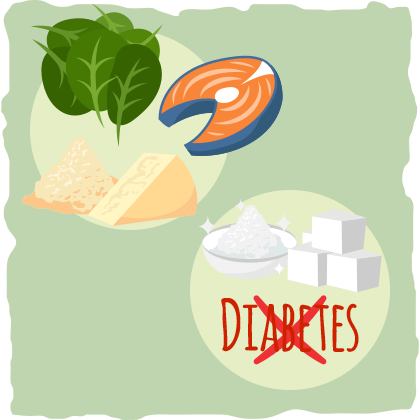
Although it is a stretch to say that a paleolithic ketogenic diet can reverse type 1 diabetes, a recent critical evaluation of the literature confirms that the ketogenic diet is the best-documented diet for controlling type 1 diabetes.
The group of 26 leading researchers stated that there is
“…evidence supporting the use of low-carbohydrate diets as the first approach to treating type 2 diabetes and as the most effective adjunct to pharmacology in type 1. They represent the best-documented, least controversial results.”
The Takeaway: A whole-food-based ketogenic diet is the best diet for keeping type 1 diabetes under control and may even help treat it.
Recommendations: if you have type 1 diabetes, a whole-food based ketogenic diet may be the best diet for you. However, make sure you consult with your doctor about adjusting your treatment plan before making these changes.
For more in-depth information, check out:
Improving Blood Pressure With the Ketogenic Diet
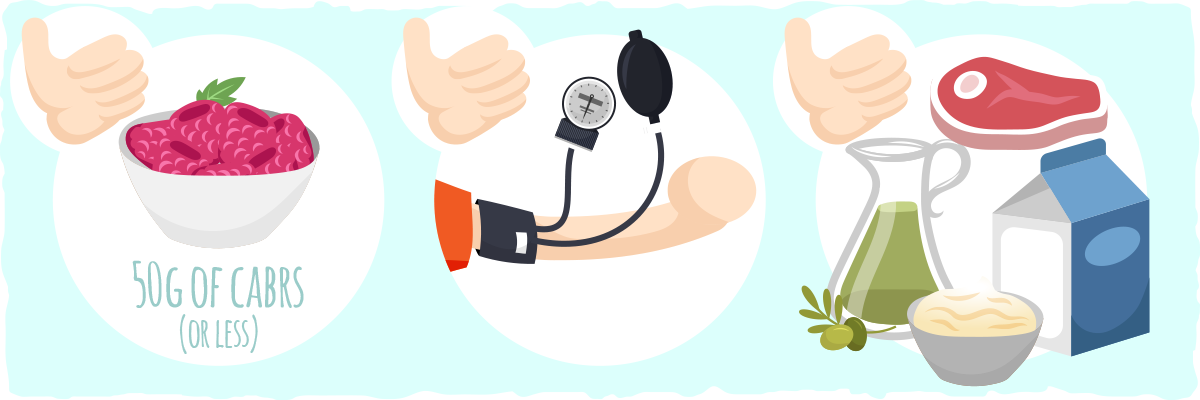
According to the World Health Organization, high blood pressure is estimated to cause about 12.8% of the total of all deaths. Luckily, The ketogenic diet may be the solution, according to a 2007 study.
In this study, researchers compared the impact of a low-carbohydrate diet and three other diets on blood pressure and other measures of cardiovascular fitness in women. After the 12 month trial, all subjects who successfully completed their respective diet experienced notable reductions in body mass, triglycerides, and LDL cholesterol. Those in the low-carbohydrate diet group, however, had the best results.
These participants decreased their systolic blood pressure by an average of 7.6 mm Hg — twice more than any other group. Their diastolic pressure also decreased by 2.93% from 75 mm Hg to 72.8 mm Hg.
These findings were confirmed in another interesting study. Researchers compared the effects of the low-carbohydrate diet to the effects of a combination of a low-fat diet and orlistat (a weight-loss and blood pressure lowering medication) on blood pressure. The researchers stated that the low-carbohydrate dietary intervention “was more effective for lowering blood pressure.”
Does this mean that you should throw away your blood pressure medication and dive into the ketogenic diet? Not just yet — you should first consult with your dietitian or doctor to see if cutting some carbs is a suitable strategy for you
The Takeaway: A low-carbohydrate diet is more effective than a low-fat and moderate-fat diet at reducing blood pressure. Limiting carbohydrates even produces better results than the combination of a low-fat diet and a weight-loss/blood pressure drug.
Recommendations: If you are interested in lowering blood pressure, a diet with 50 or fewer grams of carbohydrates per day might be an effective method. Consult with your doctor and dietitian to see if it’s a suitable choice based on your medical history.
For more in-depth information, check out:
The Power to Improve the Alzheimer’s Disease
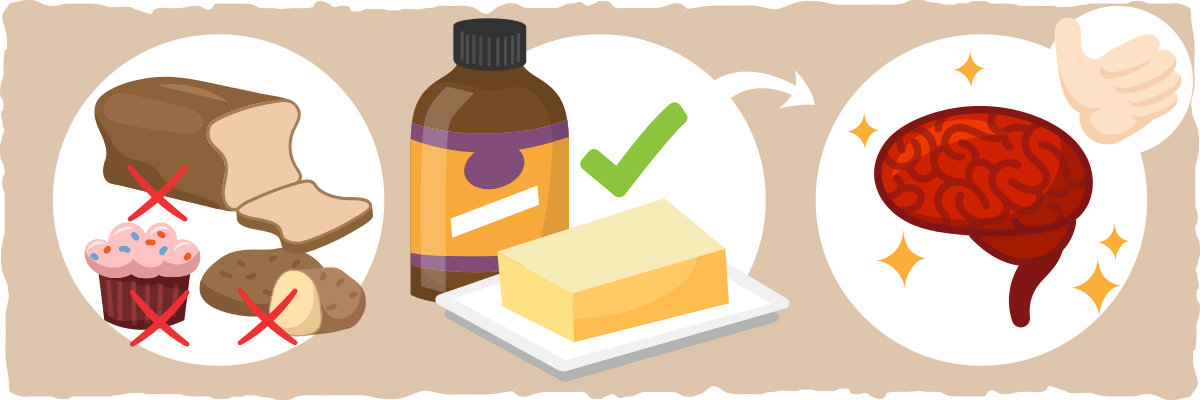
Earlier in this article, I briefly mentioned how consuming too much sugar can impair brain function and cause plaque build up in the brain. Many studies on Alzheimer’s disease patients agree with the biochemistry as well. In fact, A group of scientists reviewed the literature and concluded that “high carbohydrate intake worsens cognitive performance and behavior in patients with Alzheimer’s disease.” This means that eating more carbohydrates cause more problems in the brain. Will the opposite (eating fewer carbs) improve brain function?
Recent studies on the ketogenic diet provide evidence that it may be able to reverse Alzheimer’s disease. Experiments on ketone supplementation specifically found that the ketone body, β-hydroxybutyrate, improved memory function of Alzheimer’s patients.
Scientists validated this finding by giving MCT oil (a fat found in coconut oil that is usually converted into ketones in the liver) to Alzheimer’s patients and tested their memory. They found that the Alzheimer’s patients experienced greater memory recall that directly correlated with their blood levels of ketone bodies.
Other benefits that ketone bodies have on brain health are:
- They prevent neuronal loss.
- They preserve neuron function.
- They protect brain cells against multiple types of injury.
The Takeaway: The combination of carbohydrate restriction and ketones improves brain function and may help prevent and reverse Alzheimer’s disease. Conversely, a high-carbohydrate diet is deleterious to brain health.
Recommendations: Try supplementing with MCT oil and restricting carbohydrates to improve brain function and prevent (or reduce the severity of) Alzheimer’s disease.
Parkinson’s Disease Symptoms Reduced By Ketogenic Diet
One recently published clinical study tested the effects of the ketogenic diet on symptoms of Parkinson’s disease. In this study, Parkinson’s disease patients experienced a mean of 43% reduction in Unified Parkinson’s Disease Rating Scale scores after a 28-day ketogenic diet.
All participating patients reported moderate to very good improvement in symptoms. The researchers hypothesize that these results are partly due to the increase in essential fatty acid consumption that is common with ketogenic diets.
The Takeaway: The ketogenic diet improves the quality of life and reduces the symptoms of patients with Parkinson’s disease.
Recommendations: If you have or are developing Parkinson’s disease, speak to your doctor about going on a ketogenic diet and join the Ruled.me community for support.
Improve Cholesterol Levels and Reverse Heart Disease with The Ketogenic Diet
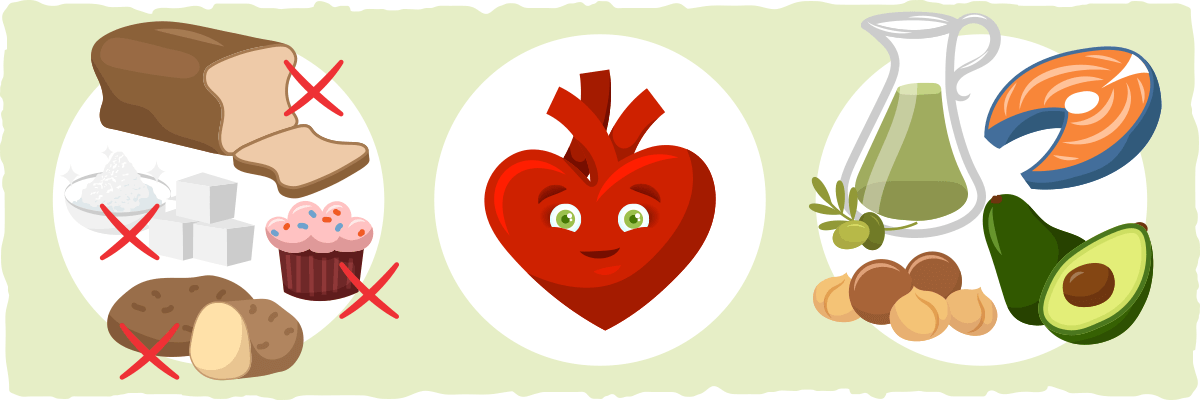
Although the ketogenic diet tends to be high in saturated fat (commonly thought to increase cholesterol), it has been found to improve cholesterol levels and reduce the risk of heart disease.
In a recent meta-analysis published in the British Journal of Nutrition, researchers investigated the impacts of very-low-carbohydrate ketogenic diets (VLCKD) on key metrics of cardiovascular health including HDL cholesterol. The authors defined a VLCKD as a diet of less than 50g of carbohydrates.
After examining 12 studies including 1257 patients, they found that the VLCKD increases HDL by double the average increase in HDL of the low-fat dieters. As a result, the authors concluded that carbohydrate-restricted diets confer cardiovascular benefits because they improve levels on HDL in the body.
However, one of the most important risk factors for heart disease is the “bad” LDL cholesterol. How does the ketogenic impact LDL cholesterol levels?
In a 2006 study, researchers assessed the effects of carbohydrate restriction on LDL cholesterol in a group of 29 men for a 12-week weight-loss intervention. Their LDL cholesterol levels improved, leading to the conclusion that:
…weight loss induced by carb restriction favorably alters the secretion and processing of plasma lipoproteins, rendering VLDL, LDL, and HDL particles associated with decreased risk for atherosclerosis and coronary heart disease.
In another study on women, researchers confirmed that the ketogenic diet resulted in favorable changes in LDL particles consistent with lower cardiovascular disease risk. However, the total LDL cholesterol did not change. This is why it is important to test the levels of different LDL particles. Looking at the LDL number itself may be misleading, especially on the ketogenic diet.
The Takeaway: Low carbohydrate diets can help optimize cholesterol levels, and reduce the risk of heart disease.
Recommendations: If you have high levels of LDL particles and VLDL particles, consider adopting a carbohydrate-restricted diet. To optimize your LDL cholesterol levels, consider adopting a diet high in healthy monounsaturated fats and low-carb vegetables. Some examples of keto-friendly foods that are high in monounsaturated fats are olive oil, avocado, and macadamia nuts.
For more in-depth information, check out:
A Potential Treatment for Polycystic Ovary Syndrome and Infertility
Polycystic ovary syndrome (PCOS) is responsible for as much as 70 percent of infertility issues in women.
The primary cause of this condition is elevated insulin levels. When insulin levels are high, they cause the ovaries to produce more androgens (like testosterone) and decrease the production of sex-hormone binding globulin — a glycoprotein that prevents testosterone from freely entering cells.
With more androgen production and less sex-hormone binding globulin, free testosterone can freely float through the blood and interact with cells. Depending on what cells it influences, this can result in hair growth on the chest and face, mood swings, fatigue, low sex drive, acne, infertility and other PCOS symptoms.

As androgen levels continue to increase, they stimulate 5-alpha reductase activity — an enzyme that converts testosterone to a more potent metabolite called dihydrotestosterone. This makes PCOS symptoms even worse.
The research on how diet affects PCOS is minimal, but there is one compelling study on the ketogenic diet and women with PCOS. In this study, five overweight women ate a ketogenic diet (20 grams of carbohydrates or less per day) for 24 weeks. The results were astounding — average weight loss was 12%, free testosterone decreased by 22%, and fasting insulin levels dropped by 54%. What’s even more impressive is that two of the women became pregnant despite previous infertility problems.
Although this is a small study, the results are clearly backed by the fact that the ketogenic diet has been found in many other studies to help reverse insulin resistance and reduce insulin levels, the two main causes of PCOS.
The Takeaway: The ketogenic diet can help improve fertility and reverse PCOS.
Recommendations: If you have PCOS, then carbohydrate restriction may work for you. However, there is one important caveat for women who are on the ketogenic diet. The diet may increase cortisol levels, which results in increased insulin resistance. For some women, it may be best to reduce carbohydrate intake slowly.
For more in-depth information, check out:
Reverse Non-Alcoholic Fatty Liver Disease with the Ketogenic Diet
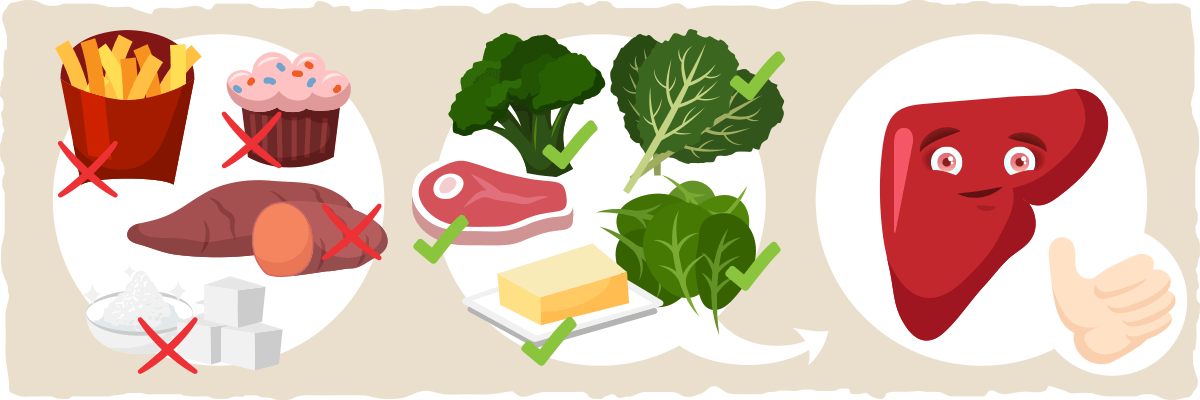
Non-alcoholic fatty liver disease is associated with type 2 diabetes, obesity, heart disease, and hyperlipidemia, and it probably will not develop unless one or more of these issues are present as well.
We’ve already explored how the ketogenic diet helps with diabetes, heart disease, and hyperlipidemia, does this mean it helps with non-alcoholic fatty liver disease as well?
A recent pilot study put five patients on the ketogenic diet (less than 20 grams per day of carbohydrate). At the end of six months, the average weight loss was 28 pounds (but this wasn’t the most surprising finding). Each patient underwent a liver biopsy, and four of the five patients had a reduction in liver fat, inflammation, and fibrosis. However, this is a small pilot study that also used supplements, so the results are not conclusive. What does the rest of the research say?
In a 2016 meta-analysis and systematic review, the researchers found that the low carbohydrate diet decreased fat in the liver significantly, but liver function tests did not improve significantly. When we look closely at the studies in the meta-analysis, they either found no effect on liver enzyme levels or a significant effect. In other words, the liver function of some people stayed the same on the low-carbohydrate diet while others improved significantly. Why the difference?
My guess is that if subjects were required to eat more fibrous foods (like low-carbohydrate vegetables), then they probably would have had results similar to the small pilot study.
The Takeaway: A whole food based ketogenic diet may be the best diet for reversing fatty liver disease.
Recommendations: If you have fatty liver disease, then start restricting carbohydrates and eating low-carb vegetables like spinach, kale, and broccoli with every meal.
For more in-depth information, check out:
The Ketogenic Diet Helps Cancer Patients
Recently, there has been more talk about the potential of ketogenic diet being a cancer treatment, but what does the available literature have to say about that?
A recent meta-analysis looked at the literature on 32 glioma patients (people that had a tumor in their brain or spinal cord) treated using the ketogenic diet as an alternative or complementary therapy. The researchers noted that some patients were more responsive to the ketogenic diet than other patients were.
The best response was in a 3-year-old girl who had complete remission after five years of treatment with a ketogenic diet. Two other patients also experienced complete remission after the diet, while another experienced cancer progression after stopping the diet.

These are incredible results, but we must remember that these results are due to a combination of a ketogenic diet and conventional treatment, not the ketogenic diet alone.
It is evident, however, that the ketogenic diet is one of the best diets for cancer patients. According to dietitian Heidi H. Pfeifer at the MGH Center for Dietary Therapy, the ketogenic diet may be effective because of the following two reasons.
First, the ketogenic diet deprives cancer cells of their primary source of energy — glucose. While many of the cancer cells are starving, the body is running on ketones, which the cancer cells cannot use for fuel.
Second, the ketogenic diet suppresses insulin like growth factor (IGF-1). This molecule is associated with the formation and progression of cancerous cells. IGF-1 levels are increased when we eat more carbohydrates. Because the ketogenic diet is much lower in carbohydrates, scientists suspect that this suppresses IGF-1 production, slowing the formation of cancerous cells.
The Takeaway: The ketogenic diet is one of the best complementary treatments for people who have cancer.
Recommendations: Ask your doctor about including the ketogenic diet in your cancer treatment program, and use Ruled.me for support and guidance through your recovery process.
For more in-depth information, check out:
Prevent and Reduce the Severity of Migraines
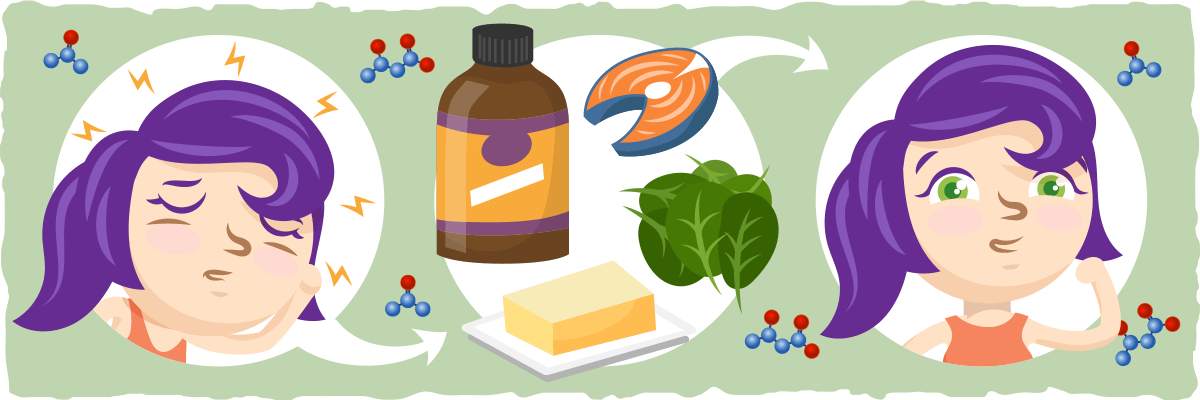
The first study on the Ketogenic diet and how it affects migraines came a few years after its first use for epilepsy in 1928. The study was done on 28 patients, and only 9 of them showed “some improvement” although most of them admitted poor compliance.
In a review of the research on the ketogenic diet and migraines (over seventy years later), the scientists concluded that the ketogenic diet “ameliorates headaches and reduces drug consumption in migraineurs, while the SD [standard low-calorie diet] is fully ineffective on migraine in a short term observation.”
The researchers hypothesized that the positive effects that the ketogenic diet has on migraines are due to how ketone bodies inhibit neural inflammation and enhance brain mitochondrial metabolism. The ketone bodies do this by blocking high concentrations of glutamate (commonly found in both migraine and epilepsy sufferers) and reducing oxidative stress.
The Takeaway: The ketogenic diet and ketones are an effective treatment for migraineurs.
Recommendations: If you suffer from migraines or recurring headaches, consider trying the ketogenic diet to get into ketosis or taking supplemental ketones in the form of MCT oil. Combining MCT oil with the ketogenic diet will probably give you the best results.
How The Ketogenic Diet Benefits Us All
We spent the majority of this article going over how the ketogenic diet helps people with specific conditions, but there are some benefits that everyone can experience. (The ketogenic diet is fun for the whole family.) Below, you’ll find four primary benefits of the ketogenic diet.
1. Boosts Brain Function
Following the consumption of a ketogenic diet, brain cells become more efficient, brain inflammation is reduced, and health-promoting neurotrophic factors are activated. This is caused by the combination of carbohydrate restriction and ketone use.
Ketones, in particular, give the brain the opportunity to balance the neurotransmitters called glutamate and GABA (gamma-Aminobutyric acid). Glutamate is the primary excitation neurotransmitter (promotes stimulation) in the body and GABA is the main inhibitory neurotransmitter (reduces stimulation) in the body.
Brain fog and a lack of focus can be caused by having too much glutamate and very little GABA. This will happen if your brain has to use glutamate and glutamic acid for fuel, which leaves little left over to be processed into GABA. By giving the brain another form of energy when you break down ketones, you’re able to balance out the neurotransmitter production.
This balance (increase in GABA production) helps to reduce the excess firing of neurons in the brain, leading to better mental focus. An added benefit of more GABA production is a reduction of stress and anxiety and an increased sense of calmness.
2. Increases Energy
As we mentioned before, research has shown that those who follow a ketogenic diet will develop better mitochondrial function and produce less reactive oxygen species.
Better mitochondrial function equates to more energy for your cells while having less reactive oxygen species increases energy efficiency. In others words, the ketogenic diet allows you to get the most out of your cells so that you can get the most out of life.
3. Decreases Inflammation and Pain
Without excess damage being caused by reactive oxygen species, the inflammatory processes of the body don’t have to be used to repair damage as frequently. This reduces inflammation levels in the body. A pleasant side effect of theses anti-inflammatory benefits is that people with chronic pain may notice a reduction in pain as well.
4. Improves Body Composition
Many studies conclude that caloric restriction is inferior to the ketogenic diet when it comes to weight loss. For example, one study split 132 people into two groups: a low-carbohydrate diet (30 grams or less of carbohydrates a day) group and a calorie-restricted, low-fat diet group.
After six months of this dietary intervention, the researchers concluded that “severely obese subjects with a high prevalence of diabetes and the metabolic syndrome lost more weight in a six-month period on a carbohydrate-restricted diet than on a fat- and calorie-restricted diet.”
If you restrict carbohydrates, then you will drop the extra pounds. This is wonderful for people who want to lose fat, but what about people who want to gain muscle?
The ketogenic diet is perfect for increasing muscles mass. This is because you will be consuming much more protein than many other diets. To find out the right amount of protein for you, use our keto-calculator.
Putting It All Together
The ketogenic diet has unique effects on the body and inside of the cells that provide benefits that reach beyond what any other diet can provide.
The combination of carbohydrate restriction and ketone production reduces insulin levels, triggers autophagy (cellular clean-up), increases mitochondrial production and efficiency, reduces inflammation, and burns fat.
This broad range of effects provides a plethora of benefits for a variety of different people with a variety of different goals and health issues. Below, you’ll find a quick outline of what the ketogenic diet can do.

The Ketogenic Diet Can Help Reverse These Conditions (in some people):
- Epilepsy
- Type 2 Diabetes
- High Cholesterol
- High Blood Pressure
- High Blood Sugar
- Polycystic Ovary Syndrome
- Non-alcoholic Fatty Liver Disease
- Migraines
- Obesity
The Ketogenic Diet Can Help Reduce The Severity of These Conditions:
- Heart Disease
- Type 1 Diabetes
- Cancer
- Parkinson’s Disease
- Alzheimer’s Disease
- And the conditions mentioned above
Make sure you consult with your doctor and track relevant biomarkers before you start the ketogenic diet. This is a big adjustment for your body and your life, so do not take it lightly. If you follow our beginner’s guide, join the Ruled.me community, and have check-ups with your doctor, then you will be able to get all the benefits of the ketogenic diet and take your health back.
But what if you are otherwise healthy and just want to improve your health?
It also best for you to use our beginner’s guide, so that you can get these four benefits (with minimal side effects):
- Boost brain function
- Increase energy
- Decrease pain and inflammation
- Improve body composition
Sources:
- Treating Childhood Epilepsy: The Origins of the Ketogenic Diet — Ruled.me
- The Ketogenic Diet and Diabetes — Ruled.me
- How to Lower Your Blood Sugar Naturally — Ruled.me
- Ketogenic Diet & Cancer: Interpreting the Research for You — Ruled.me
- The Ketogenic Diet and Cancer — Ruled.me
- The Best Low Carb Vegetables for Keto — Ruled.me
- Can a Low Carb Diet Lower Blood Pressure? — Ruled.me
- The neuroprotective properties of calorie restriction, the ketogenic diet, and ketone bodies — Science Direct
- The Ketogenic Diet as a Treatment Paradigm for Diverse Neurological Disorders — NCBI
- Short term improvement of migraine headaches during ketogenic diet: a prospective observational study in a dietician clinical setting — NCBI
- KETONES INHIBIT MITOCHONDRIAL PRODUCTION OF REACTIVE OXYGEN SPECIES PRODUCTION FOLLOWING GLUTAMATE EXCITOTOXICITY BY INCREASING NADH OXIDATION — NCBI
- Effects of beta-hydroxybutyrate on cognition in memory-impaired adults. — NCBI
- The therapeutic implications of ketone bodies: the effects of ketone bodies in pathological conditions: ketosis, ketogenic diet, redox states, insulin resistance, and mitochondrial metabolism. — NCBI
- A Ketogenic Diet Favorably Affects Serum Biomarkers for Cardiovascular Disease in Normal-Weight Men — The Journal of Nutrition
- Short term improvement of migraine headaches during ketogenic diet: a prospective observational study in a dietician clinical setting — NCBI
- Long-term effects of a ketogenic diet in obese patients — NCBI
- Raised blood pressure — WHO
- Effect of orlistat-induced weight loss on blood pressure and heart rate in obese patients with hypertension. — NCBI
- Neuroprotective and disease-modifying effects of the ketogenic diet — NCBI
- Type 1 diabetes mellitus successfully managed with the paleolithic ketogenic diet — Edorium Journals Polycystic Ovary Syndrome (PCOS) — Deep Dyve
- Beyond weight loss: a review of the therapeutic uses of very-low-carbohydrate (ketogenic) diets. — NCBI
- The effects of a low-carbohydrate, ketogenic diet on the polycystic ovary syndrome: A pilot study — BioMed Central
- The effects of low carbohydrate diets on liver function tests in nonalcoholic fatty liver disease: A systematic review and meta-analysis of clinical trials — NCBI
- The Effect of a Low-Carbohydrate, Ketogenic Diet on Nonalcoholic Fatty Liver Disease: A Pilot Study — Springer Link
- A meta-analysis of randomized trials for the treatment of nonalcoholic fatty liver disease. — NCBI
